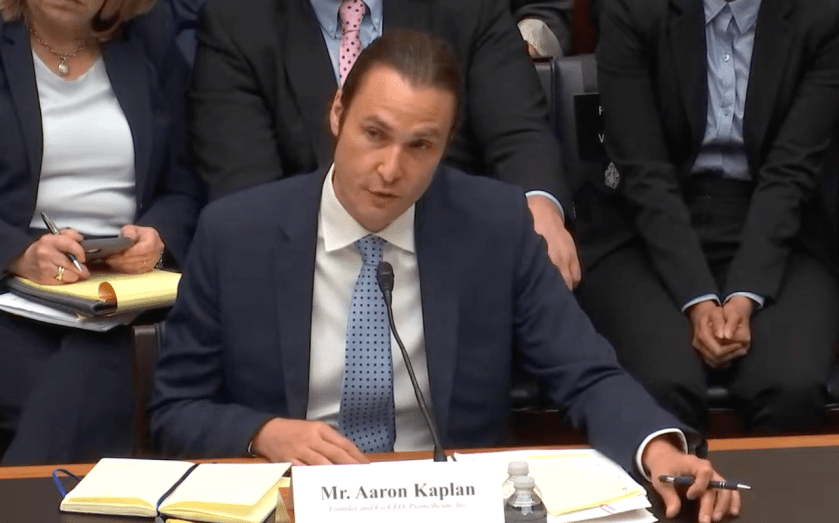
Aaron Kaplan, co-CEO of Prometheum.
Regular readers of this newsletter know I am no fan of Prometheum, the off-brand crypto firm that claims to have found a “compliant” way to offer popular cryptocurrencies under existing securities regulations. Operated by two brothers with a dubious legal pedigree, Prometheum took another step this week in its cockamamie scheme to get Ethereum declared a security and become the only authorized dealer for it. The crazy thing is that the scheme just might work—for a minute at least.
The latest development is that Prometheum just announced it will begin to custody Ethereum. This is hardly unusual—lots of firms custody crypto assets—but for the fact that is the only company to possess a special license that lets it hold and transact in digital assets. The legal gymnastics are complicated (Leo has an excellent rundown), but a very simplified version is that Prometheum also has a license to operate a trading platform and that, by combining the two licenses, it can legally sling Ethereum as a security—and is hoping regulators have no choice but to recognize the designation.
All of this goes against the legitimate claims of the crypto industry, which argues that blockchain is a new technology that obviates the need for the division of functions that exists in traditional securities regimes. It’s also ironic that would-be crypto pioneer Prometheum doesn’t appear to have spent a lick on technology, but reserved its entire outlay for legal and PR expenses. Still, if you squint your eyes, you can sort of see why the combination of the company’s two licenses amount to a legal right to offer Ethereum as a security.
The question, though, is how it came to get one of those licenses—in particular the special custody one—in the first place. The answer is that the self-regulatory body called FINRA gave it to them. FINRA is nominally independent but still ultimately beholden to the SEC, which created the special license in the first place, and this is where the plot gets thicker.
The special crypto license, you see, was created right before current SEC Chair Gary Gensler arrived on the scene—it wasn’t Gensler’s idea. That’s probably why, during Gensler’s tenure, the subordinate FINRA refused to grant the license to anyone, until suddenly Prometheum got its hands on one at a very convenient time—right before firms were to testify before Congress on the futility of current crypto regulations. And wouldn’t you know it, Prometheum received a plum invitation to testify. This resulted in one of the brothers giving canned testimony that echoed Gensler-style talking points about how it is possible to operate within the regulations.
Hmmm. I don’t think it’s crazy to surmise that Gensler, in his scorched-earth legal campaign against the crypto industry, leaned on FINRA to give Prometheum the special license it had denied to every other firm, including publicly traded Robinhood. Having Prometheum out there selling Ethereum as a security would suit Gensler’s purposes, and it’s also telling that FINRA has stayed conspicuously silent about this new “compliant” crypto firm born under its watch. Sure, it might sound conspiratorial to think the wily Gensler is pulling all the strings here. But first read this thread and tell me everything is on the level.
The question now is what happens next. If Prometheum actually goes ahead and starts hosting a platform where popular cryptocurrencies are securities, the whole thing is going to be short-lived. The crypto industry will find every way it can to attack the flimsy legal theory on which Prometheum is premised, and get Gensler’s SEC rung up in court again for being “arbitrary and capricious.” Meanwhile, it’s unclear where Prometheum is going to find customers to use its jerry-rigged platform—especially with Ethereum ETFs on the way. The most likely outcome is that the company soon blows away and with it the Prometheum brothers’ 15 minutes of crypto fame.
Jeff John Roberts
jeff.roberts@fortune.com
@jeffjohnroberts
DECENTRALIZED NEWS
Baakt, the ill-starred crypto venture launched by stock exchange giant Intercontinental, says it is almost out of cash while its share price is barely above $1. (CoinDesk)
Ransomware criminals extracted $1.1 billion of crypto payouts in 2023, a record amount after law enforcement actions the previous year resulted in an unusual decline. (Chainalysis)
Bitcoin surged close to $45,000, its highest figure since the ETF launch on Jan. 12, in a rally driven by whale purchases. (CoinDesk)
DCG filed an objection to Genesis Global‘s plan to exit bankruptcy on the grounds that its effective date doesn’t account for a jump in Bitcoin prices, and will shortchange equity holders. (WSJ)
Chinese Bitcoin miners are flocking to Ethiopia, lured by a friendly government and some of the world’s lowest energy prices, even as half the country lacks access to electricity. (Bloomberg)
MEME O’ THE MOMENT
This news is republished from another source. You can check the original article here

